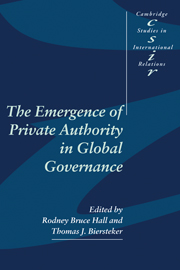Book contents
- Frontmatter
- Contents
- List of figures
- List of tables
- List of contributors
- Preface and acknowledgements
- Part I Introduction: theorizing private authority
- Part II Market authority: globalization and “globaloney”
- 3 Economic governance in an electronically networked global economy
- 4 Global finance, political authority, and the problem of legitimation
- 5 The state and globalization
- Part III Moral authority: global civil society and transnational religious movements
- Part IV Illicit authority: mafias and mercenaries
- Part V Conclusions and directions
- Bibliography
- Index
- CAMBRIDGE STUDIES IN INTERNATIONAL RELATIONS
5 - The state and globalization
Published online by Cambridge University Press: 22 September 2009
- Frontmatter
- Contents
- List of figures
- List of tables
- List of contributors
- Preface and acknowledgements
- Part I Introduction: theorizing private authority
- Part II Market authority: globalization and “globaloney”
- 3 Economic governance in an electronically networked global economy
- 4 Global finance, political authority, and the problem of legitimation
- 5 The state and globalization
- Part III Moral authority: global civil society and transnational religious movements
- Part IV Illicit authority: mafias and mercenaries
- Part V Conclusions and directions
- Bibliography
- Index
- CAMBRIDGE STUDIES IN INTERNATIONAL RELATIONS
Summary
This chapter attempts to recover the ways in which the state participates in governing the global economy in a context increasingly dominated by deregulation, privatization, and the growing authority of non-state actors. A key organizing proposition, derived from my previous work on global cities, is the embeddedness of much of globalization in national territory, that is to say, in a geographic terrain that has been encased in an elaborate set of national laws and administrative capacities. The embeddedness of the global requires at least a partial lifting of these national encasements, and hence signals a necessary participation by the state, even when it concerns the state's own withdrawal from regulating the economy.
The question becomes one of understanding the specific type of authority/power this participation might entail for the state or, more precisely, for the particular state institutions involved. Does the weight of private, often foreign, interests in this specific work of the state become constitutive of that authority and indeed produce a hybrid that is neither fully private nor fully public? My argument is that, indeed, we are seeing the incipient formation of a type of authority and state practice that entail a partial denationalizing of what had been constructed historically as national. This conceptualization introduces a twist into the analysis of private authority because it seeks to detect the presence of private agendas inside the state, that is, inside a domain represented as public.
- Type
- Chapter
- Information
- The Emergence of Private Authority in Global Governance , pp. 91 - 112Publisher: Cambridge University PressPrint publication year: 2002
- 15
- Cited by

